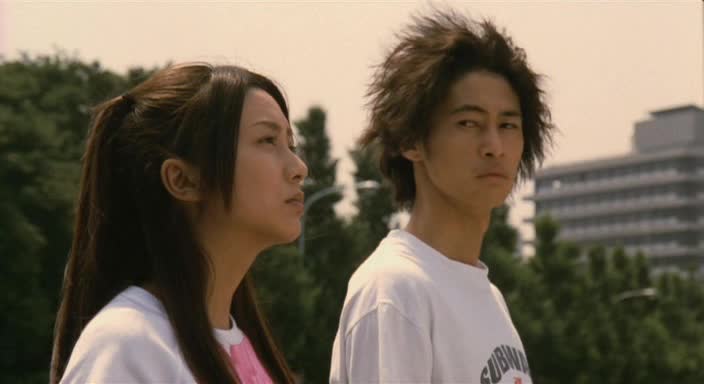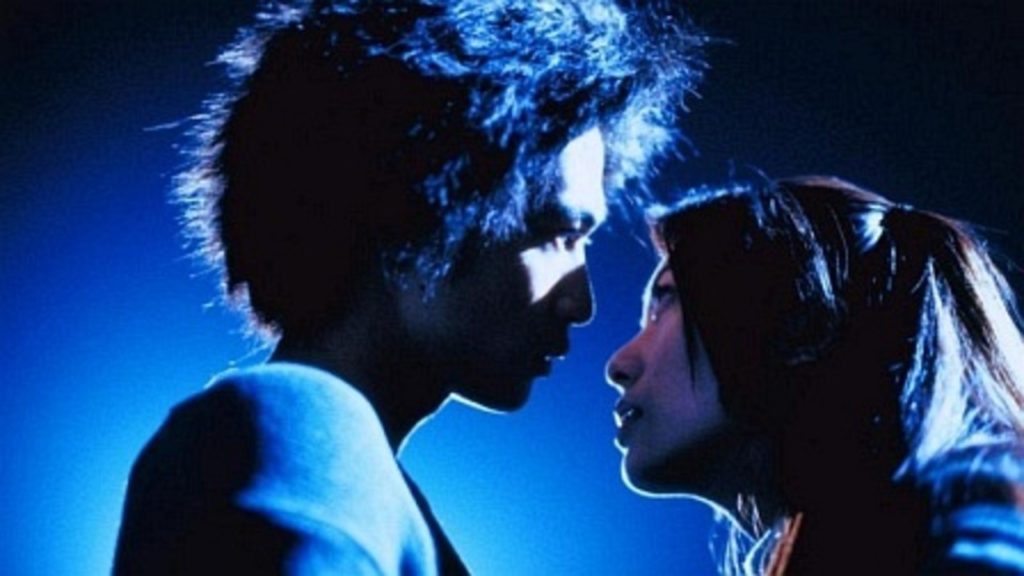June 22, 2023
·
0 feedback
By Tom Wilmot.

What’s nationality? That’s the query on the coronary heart of Go (2001), Isao Yukisada’s award-winning movie tailored from Kazuki Kaneshiro’s 2000 novel of the identical title. The film explores the endlessly complicated topic of nationality and ethnic belonging, by way of a coming-of-age story sprinkled with romance. A important and field workplace success in its native Japan, Go is again within the dialog, having acquired a worldwide Blu-ray debut via Third Window Movies. Provocative, honest, and crammed with memorable performances, Yukisada’s movie stays pertinent in its evaluation of nationality-based discrimination over twenty years later.
Together with his wild hair and bad-boy perspective, Sugihara (Yosuke Kubozuka) is indistinguishable from his highschool friends. Nonetheless, this teen is a social outcast; as a Korean-Japanese, he’s handled as not more than a brief resident of Japan – a so-called “zainichi”. Born to Korean dad and mom, Sugihara has by no means felt welcome in his start nation, nor has he ever visited his fatherland. With no place to actually name house, the excessive schooler’s path to a brighter future is made much more unsure when he meets the Japanese-born Sakurai (Ko Shibasaki) and falls for her head-over-heels.
Sugihara’s wrestle as a Korean dwelling in Japan is the central focus of Go. Focused by the Japanese authorities and fellow college students alike, it’s no surprise the late-teen adopts a jaded insurgent persona. For Sugihara and his former junior faculty classmates, there’s a transparent ‘us vs them’ mindset between Korean residents and the native Japanese. Whereas this siege mentality unifies the Koreans, it isolates them farther from an already prejudiced society. When Sugihara breaks the mould by enrolling in a Japanese highschool, he’s instantly focused by his new friends and seen as a traitor by his Korean compatriots.

Sugihara embraces a chilly and intimidating exterior as a method of self-protection, however he’s a romantic at coronary heart, curious concerning the music, literature, and movies of different international locations – simply not Japan’s. His closest buddy and fellow zainichi, Jeong-il (Takahito Hosoyamada), lends him books and tapes that transport him to worlds distant from the lonely archipelago. Solely after assembly Sakurai does Sugihara’s softer facet shine via, the charming lady setting him comfy together with her confidence. The one factor in his thoughts that might break this new relationship and drive him again into a tough, impenetrable shell is that if Sakurai have been to find his nationality. Would it not matter to her that he’s Korean, or wouldn’t it tear them aside? Such a priority ought to be dismissed as foolish, however the unlucky reality is that in Sugihara’s world, nationality issues.
It by no means feels as if Sugihara’s zainichi standing is the overbearing focus of the movie, as we spend a lot time exploring his each day life and relationships. Nonetheless, our protagonist’s nationality is at all times lurking beneath each interplay, informing nearly all facets of his character. Maybe it’s the purpose of the movie that neither Sugihara nor another resident alien’s nationality wants to return to the fore, as it’ll find yourself defining them regardless in a discriminatory nation.

Kazuki Kaneshiro’s novel offers with Sugihara’s nationality in a extra direct and intimate method. A zainichi-Korean himself, the writer is aware of higher than most the discrimination that faces international momentary residents in Japan. It’s not untoward to imagine that the bullying, social anxieties, and id questions that Sugihara endures have been much like these skilled by the Kawaguchi-born author. Written from Sugihara’s perspective, the novel captures his interior turmoil regarding his nationwide standing. In a second omitted from the movie, the excessive schooler viciously beats down a nightclub troublemaker, taking part in as much as his thorny zainichi picture in public while quietly condemning his violent actions inside.
After all, not all of Go is centred on Sugihara’s nationality struggles, as his narration reminds us greater than as soon as that this can be a love story. Strip away the zainichi component, and the movie nonetheless presents a stable coming-of-age drama about younger love and discovering your home on the earth. The connection between Sugihara and the candy Sakurai is generally light-hearted and playful, because the pair share their world views and pursuits, all while hiding their given names from each other. Equally, Sugihara’s friendships along with his countrymen are fairly touching, notably that with the well-meaning Jeong-il, who’s on the centre of the movie’s most sobering narrative intestine punch.

Slightly than go for a by-the-numbers adaptation, director Isao Yukisada injects as a lot power as potential into the movie’s two-hour runtime. The blistering opening credit sequence is typical of the early-2000s in all the things from the eye-popping graphics to the high-octane soundtrack. Yukisada steadily employs bounce cuts to take care of a stage of power that matches Sugihara’s explosive character. The director additionally maximises the cinematic potential of a number of moments from Kaneshiro’s novel, probably the most notable being Sugihara’s late-night boxing showdown within the park. A number of the e-book’s tenderer moments are additionally completed justice; Sugihara and Sakurai’s frank resort dialog captures all of the awkwardness and angst of the novel, marking one of many movie’s most engrossing scenes.
Together with its full of life filmmaking model and enlightening social observations, Go can also be blessed with an all-star forged. The romantic leads are positive to be acquainted to many viewers; Ko Shibasaki, having starred because the sneering Mitsuko in Kinji Fukasaku’s iconic Battle Royale, and Yosuke Kubozuka, who has since gone on to collaborate with Toshiaki Toyoda and Martin Scorsese. The supporting gamers aren’t too shabby both, with Shinobu Otake (The Home of the Misplaced on the Cape), Kanji Tsuda (Onoda), and the prolific Tsutomu Yamazaki all making appearances. Yamazaki threatens to steal the present as Sugihara’s strong-jawed father, Hideyoshi, bringing a welcome sense of humour to a personality that might have fairly simply been a stern, grizzled stereotype.
A deftly crafted coming-of-age drama, Go nonetheless packs a robust punch over twenty years later. The subtlety with which Isao Yukisada handles the central theme signifies that the film has aged superbly in a contemporary cinematic panorama that usually sees social critiques take priority over narrative. The movie is one other unbelievable piece of early noughties Japanese cinema that’s ripe for re-visiting by way of Third Window Movies’ new launch.
Go is launched within the UK by Third Window.
